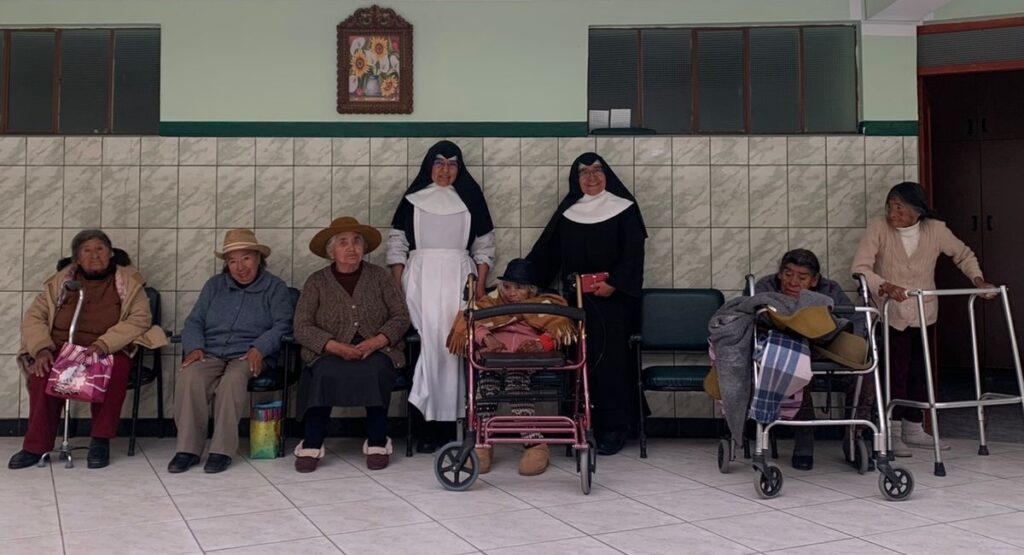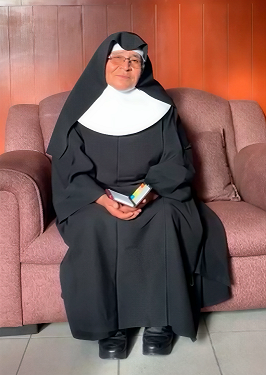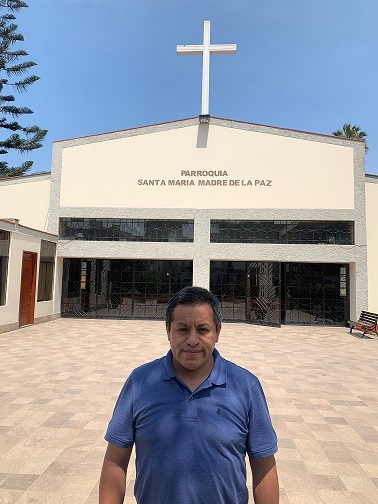Mother Lucía is the Director of the San Francisco de Asís Gerontological Center, located in the city of Cusco, Peru. This institution aims to provide comprehensive care to senior citizens, especially those who are homeless and need a safe place to live. In this interview for the 3Love Inc. blog, we talk with Mother Lucía about the care that the center’s residents receive, the teachings of St. Francis of Assisi, and the importance of raising awareness about caring for the elderly, whose day is commemorated on August 26 in Peru.
How many elderly people currently reside at the San Francisco de Asís Gerontological Center? What kind of care and attention do they receive?
The San Francisco de Asís Gerontological Center is an annex of the Sisters of the Elderly Homeless congregation. Our main house is in Lima and the annex is in Cusco. We have two homes in Peru. We currently care for 105 elderly men and women here. We provide them with comprehensive care, both spiritual and material: food, clothing, and medicine. There are six of us sisters and 23 workers, including a physical therapist and nine professional nurses. We run the home with our elderly residents, happy to be able to provide relief and comfort to so many seniors. And as you well know, here we give priority to the homeless, the vulnerable, and the needy. Care is provided 24 hours a day, and they are permanent residents.
A few years ago, work was carried out at the Gerontological Center to install handrails in the hallways and smooth the floor of the courtyard. How has this work helped improve the quality of life of the residents?
A lot, because, as you know, older people tend to hold on to things for security. So, the handrails that have been installed have helped with access to the church and the hallways. They use them a lot, both men and women, and rely on them 100%. It has helped in a very positive way.
Saint Francis of Assisi is the patron saint of animals and the environment. What lessons can we learn from this saint that we can apply to our relationship with animals and nature?
Many. In fact, Pope Francis also took his name, and his first encyclical was all about environmental conservation and animals. At this home, for example, how do we honor the name of Saint Francis of Assisi? We have some animals; we have a small farm with chickens, pigs, and parrots, which the elderly love. They feed them and talk to them. Our elderly residents like pets. And in fact, another teaching of St. Francis of Assisi is to do good, because he was always a man who sought to do good; he was a soul who sought God. He always did good to his neighbor. That is also what we do: we seek the good of our neighbors who are needy and vulnerable, of the elderly.
August 26 is Senior Citizens Day. Why is it important for families and society in general to care for, respect, and treat senior citizens well?
August is an interesting month in this home. All the elderly residents get involved, hold contests, elect the Queen of Old Age, and the main event is on August 26. They do their activities beforehand, then the contests, and there are first, second, and third place winners. They have to be rewarded. Regarding your question, it is very important for society to value senior citizens. There is a lot of neglect and a lack of interest in caring for senior citizens. Many children or close relatives of senior citizens want to leave them here, no matter what. So, we have to give priority to the elderly who really need our care because, for example, if a senior citizen has eight children, the law mandates that they must be cared for by their family, but sometimes that is not the case. It happens that they want to admit them and leave them here. Families need to realize that the legacy our senior citizens are leaving us is what we are living today. They built this society, perhaps with fewer resources than we have today, because today’s technology was not available yesterday, but they are undervalued, and we need to encourage society to value senior citizens more.
To you who care for the elderly, what personal satisfaction do you get from being able to care for them, many of whom, as you mention, sometimes come from a situation of poverty or loneliness?
Our Founding Mother, Saint Teresa of Jesus Jornet, was a Spanish woman who was a teacher in her day, worked in schools, and was highly valued. She left us this task, saying, “Take care of bodies to save souls.” We must value the elderly. There is a joy, a satisfaction in being able to care for them, to cheer them up, to encourage them. And when we see them arrive broken, sad, or beaten down by life, it is also very satisfying when, as the days go by, they improve thanks to the care we give them or the words of encouragement or comfort we sometimes offer them. Although we cannot replace the affection of a son or daughter, we do try, in the name of God, to reach their souls and console them. And we are pleased to see them improve. Some improve, rejuvenate, and live for years. Others arrive already vulnerable, extremely delicate, and sometimes they give up and pass away. There is also the satisfaction that when they do not overcome their illness or whatever it may be, we give them a dignified burial and a dignified farewell, which they might not have had otherwise.



